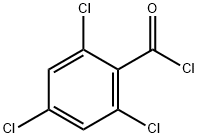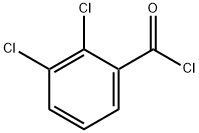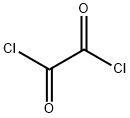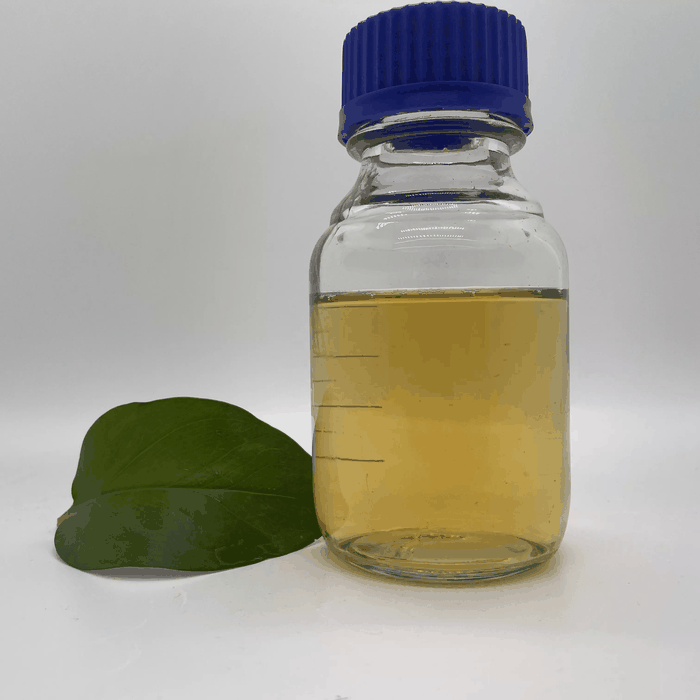2,4,6-Trichlorobenzoyl chloride
- CAS NO.:4136-95-2
- Empirical Formula: C7H2Cl4O
- Molecular Weight: 243.9
- MDL number: MFCD00075323
- SAFETY DATA SHEET (SDS)
- Update Date: 2024-05-07 14:24:42

What is 2,4,6-Trichlorobenzoyl chloride?
Description
2,4,6-Trichlorobenzoyl chloride is a chemical compound that forms during the synthesis of benzalkonium chloride. It can be used as an efficient method for the synthesis of fatty acids and cyclic peptides. The reaction products are chlorinated and have a hydroxyl group. It is used in the synthesis of fatty acids by reacting with acetic acid to produce a chlorinated fatty acid. Hydroxyl groups react with 2,4,6-trichlorobenzoyl chloride to form a chlorinated hydroxy fatty acid.
Chemical properties
clear yellow liquid
The Uses of 2,4,6-Trichlorobenzoyl chloride
2,4,6-Trichlorobenzoyl chloride may be used in the preparation of:
- γ-lactone and δ-lactone
- aliphatic aromatic anhydrides, required for the synthesis of amphiphilic hyaluronan
- mixed anhydride, required for the synthesis of angelate esters
- synthesis of both spongistatin 1 and spongistatin 2
- large-ring lactones in high yields.
What are the applications of Application
2,4,6-Trichlorobenzoyl chloride has been shown to inhibit cervical cancer cell growth and reduce the incidence of cervical cancer by inhibiting DNA replication.
Properties of 2,4,6-Trichlorobenzoyl chloride
| Melting point: | 165-166 °C |
| Boiling point: | 107-108 °C/6 mmHg (lit.) |
| Density | 1.561 g/mL at 25 °C (lit.) |
| refractive index | n |
| Flash point: | >230 °F |
| storage temp. | Sealed in dry,Room Temperature |
| solubility | Acetonitrile (Slightly), Chloroform (Sparingly), Ethyl Acetate (Slightly) |
| form | Liquid |
| color | Clear yellow |
| Specific Gravity | 1.561 |
| Water Solubility | Reacts with water. |
| Sensitive | Moisture Sensitive |
| BRN | 2050280 |
| CAS DataBase Reference | 4136-95-2(CAS DataBase Reference) |
Safety information for 2,4,6-Trichlorobenzoyl chloride
| Signal word | Danger |
| Pictogram(s) |
 Corrosion Corrosives GHS05 |
| GHS Hazard Statements |
H314:Skin corrosion/irritation |
| Precautionary Statement Codes |
P280:Wear protective gloves/protective clothing/eye protection/face protection. P363:Wash contaminated clothing before reuse. P303+P361+P353:IF ON SKIN (or hair): Remove/Take off Immediately all contaminated clothing. Rinse SKIN with water/shower. P305+P351+P338:IF IN EYES: Rinse cautiously with water for several minutes. Remove contact lenses, if present and easy to do. Continuerinsing. P405:Store locked up. |
Computed Descriptors for 2,4,6-Trichlorobenzoyl chloride
| InChIKey | OZGSEIVTQLXWRO-UHFFFAOYSA-N |
New Products
(S)-3-Aminobutanenitrile hydrochloride 4-Methylphenylacetic acid N-Boc-D-alaninol N-BOC-D/L-ALANINOL Tert-butyl bis(2-chloroethyl)carbamate 3-Morpholino-1-(4-nitrophenyl)-5,6-dihydropyridin- 2(1H)-one Furan-2,5-Dicarboxylic Acid Tropic acid 1-Bromo-3,5-Di-Tert-Butylbenzene S-2-CHLORO PROPIONIC ACID ETHYL ISOCYANOACETATE 2-Bromo-1,3-Bis(Dimethylamino)Trimethinium Hexafluorophosphate 4-IODO BENZOIC ACID 3-NITRO-2-METHYL ANILINE 1-(2,4-DICHLOROPHENYL) ETHANAMINE (2-Hydroxyphenyl)acetonitrile 4-Bromopyrazole 2-(Cyanocyclohexyl)acetic acid 4-methoxy-3,5-dinitropyridine 1-(4-(aminomethyl)benzyl)urea hydrochloride 2-aminopropyl benzoate hydrochloride diethyl 2-(2-((tertbutoxycarbonyl)amino) ethyl)malonate tert-butyl 4- (ureidomethyl)benzylcarbamate Ethyl-2-chloro((4-methoxyphenyl)hydrazono)acetateRelated products of tetrahydrofuran








You may like
-
 4136-95-2 2,4,6-Trichlorobenzoyl chloride 98%View Details
4136-95-2 2,4,6-Trichlorobenzoyl chloride 98%View Details
4136-95-2 -
 2,4,6-Trichlorobenzoyl chloride CAS 4136-95-2View Details
2,4,6-Trichlorobenzoyl chloride CAS 4136-95-2View Details
4136-95-2 -
 2,4,6-Trichlorobenzoyl Chloride CAS 4136-95-2View Details
2,4,6-Trichlorobenzoyl Chloride CAS 4136-95-2View Details
4136-95-2 -
 2,4,6-Trichlorobenzoyl chloride CAS 4136-95-2View Details
2,4,6-Trichlorobenzoyl chloride CAS 4136-95-2View Details
4136-95-2 -
 1975-50-4 98%View Details
1975-50-4 98%View Details
1975-50-4 -
 2-HYDROXY BENZYL ALCOHOL 98%View Details
2-HYDROXY BENZYL ALCOHOL 98%View Details
90-01-7 -
 14714-50-2 (2-Hydroxyphenyl)acetonitrile 98+View Details
14714-50-2 (2-Hydroxyphenyl)acetonitrile 98+View Details
14714-50-2 -
 118753-70-1 98+View Details
118753-70-1 98+View Details
118753-70-1
Statement: All products displayed on this website are only used for non medical purposes such as industrial applications or scientific research, and cannot be used for clinical diagnosis or treatment of humans or animals. They are not medicinal or edible.